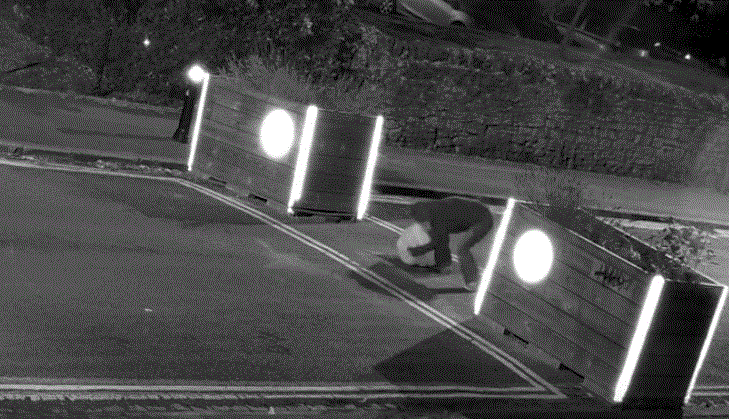
Late night road protestor pouring concrete in a former bollard-hole | Youtube
By Jo Nova
Build Back Worse suffers a set-back
It’s hard to believe someone thought that adding artificial blockages to roads would free people from their vehicle-addiction. As if making car trips artificially long, circuitous and inconvenient would teach people to love walking?
It’s part of the 15 minute city plan, where everything was supposed to be within a heavenly short walk from home, so we could give up cars, save the planet, change the atmosphere and get fit too. But the Deplorables didn’t like it.
The idea of a Low Traffic Network (LTN) sounded so apple-pie. Everyone wants fewer cars on the road. So when pollsters asked deliberately ambiguous questions, people would say “yes” they liked the idea. But living with LTN’s wasn’t much fun when it turned out it was their car the overlords wanted to get rid of. And so the protests and petitions began. Under the cover of darkness, people set bollards on fire, attacked them with chainsaws, and even poured concrete in the anchor holes so it was harder to replace them.
But what really seems to have got the attention of politicians is when their own party splits and the renegades win. As Tim Abrahams at UnHerd describes it, politicians are backing away quickly now after a couple of safe Labor council seats went to Labor rebels who left the party and ran on “pro-motorist” platforms.
The revenge of Britain’s motorists
Tim Abrahams at UnHerd
There is a sense that politicians are increasingly waging a “war on cars”. Measures include road filtering, to give priority to low-carbon methods of transport, and placing extra charges on polluting vehicles, in a push towards net zero. The shift is prompting anguished debate and splits within parties.
Earlier this month, Labour lost one of its safest council seats in the country to a former party member-turned-independent who stood opposed to the imposition of LTNs across Newham, in East London. Last autumn, former Labour politician Lutfur Rahman was returned as mayor of Tower Hamlets, also in East London, deposing the party’s chosen incumbent, on a pro-motorist platform; one of his first acts was to axe a newly installed LTN and demand a review of the others across his borough.
In Oxford City, large swathes of Labour’s local party have defected to an independent group fighting the LTNs and the traffic schemes that will supersede them; in March, its official candidate in the Littlemore ward came within an inch of being beaten by such an independent.
The idea is gathering a bad smell so fast one Liberal Democrat in Oxford (the “Cabinet Member for Highway Management“) is now telling Tim Abrahams that the LTN’s weren’t his idea and it’s “not a core scheme”. As Abrahams tells it, the Liberal Democrats are part of the “rainbow coalition of progressive parties” who are in charge at Oxford — and it was something they once promoted. It’s quite the backflip.
Perhaps the best news is that bollards are going at Oxford:
Three years after traffic filtering was trialled, the bollards and planters are to be replaced by other forms of traffic calming, such as bus gates monitored by traffic cameras and a workplace car parking levy.
The message has got through to the top. On a Federal level the Transport Secretary even called last week for councils to “review unpopular anti-car schemes“. Mark Harper said he had stopped government funding for project “that are about… banning cars or making it difficult for motorists”.
Higher costs, less spare time, more gridlock and less equity: Who could have seen that coming?
What seems the most astonishing is that the whole plan worked like organised government-vandalism — the tyrants were Building Back Worse. They weren’t building new infrastructure, they were ruining perfectly good roads. They reduced options, curtailed freedoms, and somehow our lives were supposed to get better? But people could always have walked from point A to B, they just preferred to drive. There were no efficiency gains, no better choices or new rail lines, there was just less.
And not surprisingly, longer trips meant more gridlock not less, more emissions, and the costs of extra travel meant even getting a tradie to do a house-call became much more expensive:
At a political level, there is some irony in the fact that europhile supporters of LTNs have not heeded the lesson of the gilets jaunes protests in France — namely, that blue-collar workers will not be made sacrificial lambs to environmental policies. Idrees Mohammed, managing director of Oxford Lettings, a property management agency, told me that electricians now charge 60% more for a call-out into the Cowley LTN because it takes so long to get to it. Amir Steve Ali, who works in a takeaway in East Oxford, recently delivered a petition against LTNs to Downing Street with more than 30,000 signatures. “You’re trying to keep some of the roads clean-air, pollution-free — but you’ve just chucked your rubbish next door, where others are now facing gridlock,” he says. “Where’s the justice in this?”
It’s almost like the aim was never to serve, nor to change the weather, just to keep the riff-raff off the road.
The battle is far from over, but it’s nice to get a win. It is worth protesting.
Read it all at UnHerd.